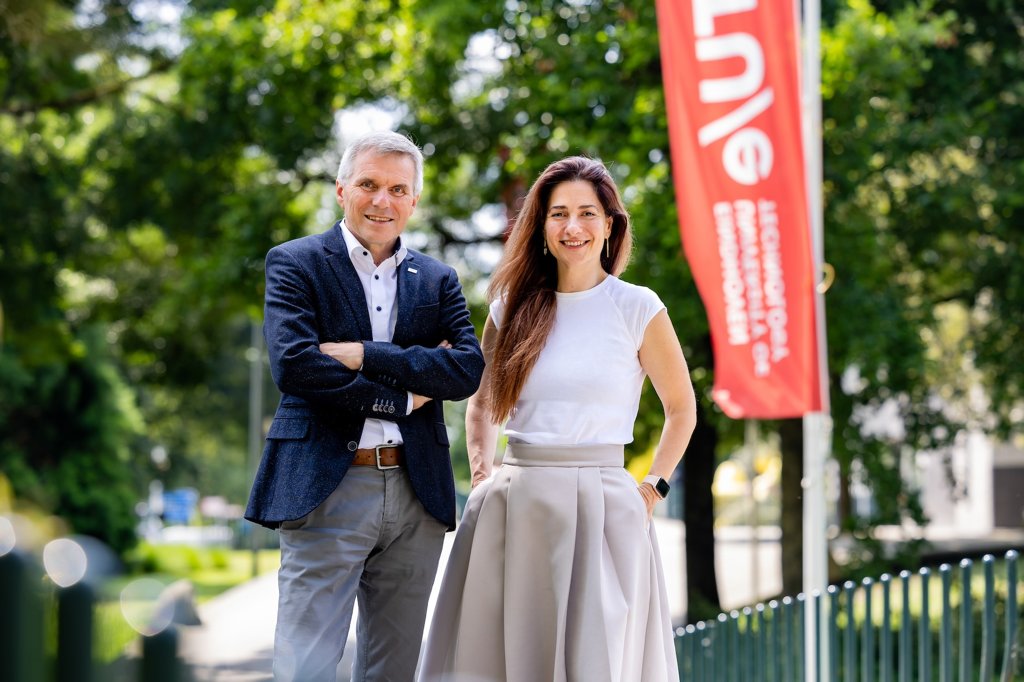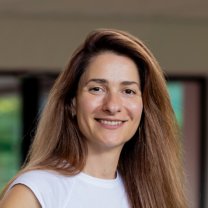Vanaf 1 september 2024 is Stella Kapodistria (TU/e) de nieuwe wetenschappelijk directeur van 4TU.AMI. In onderstaand interview reflecteren Stella en haar voorganger Johann Hurink (UT) op de directeurswisseling binnen het instituut.
Tekst in Engels
In a vibrant and forward-looking conversation, Stella Kapodistria (TU/e), the newly appointed scientific director of 4TU.AMI, and her predecessor Johann Hurink (UT) shared insights into the transition of leadership within the institute. The discussion revealed a shared commitment to maintaining the institute's strong foundation while pushing forward into new territories. The atmosphere was charged with energy as both leaders expressed a unified vision for the future of 4TU.AMI.
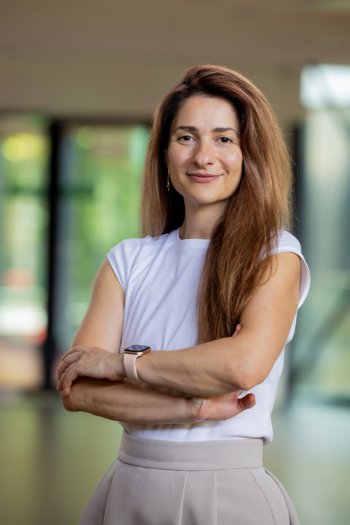 Stella, who has been deeply involved with 4TU.AMI since her arrival in the Netherlands and her appointment within the Networks Zwaartekracht consortium, enthusiastically recounted her journey and connection with the institute. "4TU.AMI was one of the key organisations that facilitated me to explore the Dutch network of mathematicians. Reflecting back, some of the grants I have acquired, some of the successes I achieved, are due to networking activities organised by centres like 4TU.AMI. Maybe it's because Johann and I both came to the Netherlands from abroad that we are so aware, sometimes even more so than our Dutch colleagues, how important these networks are," Stella explained.
Stella, who has been deeply involved with 4TU.AMI since her arrival in the Netherlands and her appointment within the Networks Zwaartekracht consortium, enthusiastically recounted her journey and connection with the institute. "4TU.AMI was one of the key organisations that facilitated me to explore the Dutch network of mathematicians. Reflecting back, some of the grants I have acquired, some of the successes I achieved, are due to networking activities organised by centres like 4TU.AMI. Maybe it's because Johann and I both came to the Netherlands from abroad that we are so aware, sometimes even more so than our Dutch colleagues, how important these networks are," Stella explained.
As she assumes leadership, Stella sees this transition as an opportunity to further strengthen the collaboration across the entire country. “I early on realized that taking the train, for example, from Eindhoven to Twente is very doable. You can travel there, do research, and come back all in one day. So there is nothing stopping us from having an incredible collaboration, an incredible network throughout the entire country. And that is unique. There is no other country in the world with such a unique advantage. 4TU.AMI’s initiatives are aimed to facilitate such network building activities!" she remarked with enthusiasm.
Strengthening and expanding applied mathematics networks throughout the country
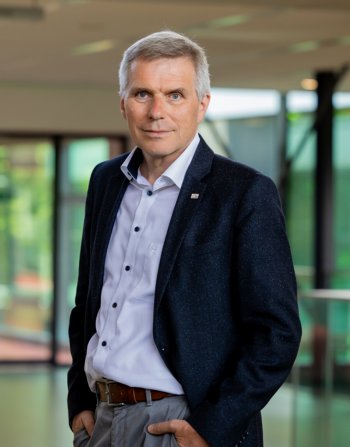 4TU.AMI is not only poised to strengthen existing networks but also to expand them. Johann Hurink shared an example of such expansion, reflecting on the integration of Groningen into the 4TU.AMI fold. "We were already well connected on an individual level. It was a natural extension, as Groningen has both mathematicians and applied mathematicians. So, the only thing remaining was to include our colleagues from Groningen at the organisational level of 4TU.AMI. The experiences are very positive for all concerned. It’s now up to the 4TU.Federation to decide on a formal collaboration. For us it’s quite simple," Johann remarked.
4TU.AMI is not only poised to strengthen existing networks but also to expand them. Johann Hurink shared an example of such expansion, reflecting on the integration of Groningen into the 4TU.AMI fold. "We were already well connected on an individual level. It was a natural extension, as Groningen has both mathematicians and applied mathematicians. So, the only thing remaining was to include our colleagues from Groningen at the organisational level of 4TU.AMI. The experiences are very positive for all concerned. It’s now up to the 4TU.Federation to decide on a formal collaboration. For us it’s quite simple," Johann remarked.
Johann is reflecting on his tenure as director of 4TU.AMI, emphasizing the natural progression it allows for leadership changes. "The 4TU.AMI director is appointed for a period of four years. That’s a good thing. It's good for both sides to take stock and ask themselves 'Are we still on the same page?' The directorate moved in the past from Delft to Twente and is now moving from Twente to Eindhoven. Alternating where the director is based allows you to increase the visibility of the local university and ensure that all involved universities are equally invested and that they equally benefit. As I was recently offered a new responsibility, and I’m only five years away from retiring, it felt like if I still wanted to start a new adventure, it was now or never, " Johann shared.
Supporting both top-down and bottom-up research initiatives through dedicated funding
Stella, already fully engaged in her new role, expressed her excitement about the opportunities ahead. "I think 4TU.AMI is a very agile organization. And extremely successful. 4TU.AMI will continue fostering both top-down and bottom-up initiatives: For developed consortia in cutting-edge areas in applied mathematics (such as in energy transition and artificial intelligence), 4TU.AMI aims to support top-down initiatives that can lead to large scale grants (with an eye towards Zwaartekracht proposals). For young researchers, 4TU.AMI offers bottom-up networking platforms," she noted, underscoring her commitment to advancing the institute's research agenda. Additionally, 4TU.AMI remains committed to supporting workshop organization through dedicated funding.
Johann added his perspective on how these initiatives have fostered collaboration within the community: “We introduced short pitches in the 4TU.AMI Summer Events. People briefly present who they are, what they do, and what they are looking for. In the coffee breaks, we saw that they were actually talking to each other about these pitches. And now more and more joint strategic research initiatives (SRIs) come out of these first connections. The SRIs have emerged bottom-up as platforms where we explore certain topics. After two years, we evaluate the outcomes. We’re now setting up a larger SRI on mathematics education. I expect that this SRI will span a longer time.”
Stimulating research into mathematics education, service teaching, and digitalization
Stella emphasized the importance of the SRI on mathematics education: “We all realised that mathematics education is not just about giving lectures, but that we need people who really study the educational aspects of our discipline. We want to stimulate career options on the teaching side. This is in line with the 4TU.AMI focus on education and the particularities of Applied Mathematics education, service teaching, and the need for educational digitalization.”
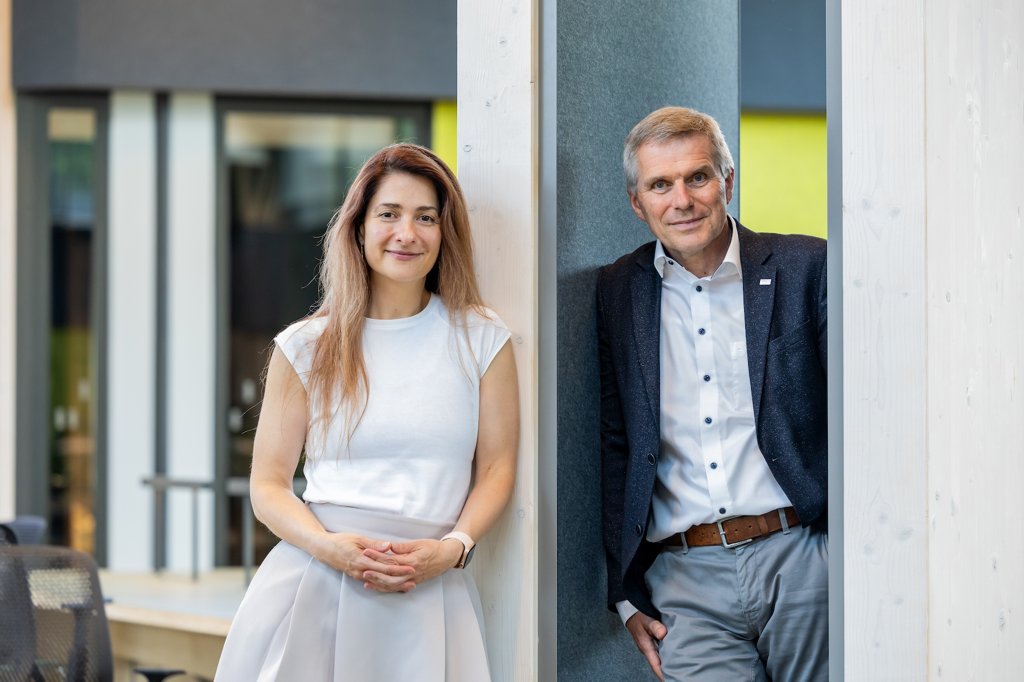
The conversation also touched on broader challenges facing the field, including the potential impact of new government policies on foreign student enrollment. Both Stella and Johann voiced their concerns about how such policies could affect the mathematics community in the Netherlands. Stella emphasized the importance of diversity in education, stating, "Having foreign students means that we are also enhancing our classes. It allows the students who were brought up in the Dutch system to be exposed to other educational systems and learn from their peers."
Call to all applied mathematicians in the Netherlands: join the next 4TU.AMI event!
As the interview concluded, Stella and Johann delivered a clear message to the mathematics community: get involved with 4TU.AMI. "Read our newsletter and don't miss our next event," Stella urged, her enthusiasm unmistakable. Johann echoed this sentiment, adding, "Precisely, don't miss the next event. Because then you know what 4TU.AMI is. I think you have to just experience it."
With Stella Kapodistria at the helm, 4TU.AMI is poised to build on its solid foundation, fostering innovation and collaboration across the Dutch mathematical community. Both Stella and Johann are confident that the institute will continue to thrive, adapting to new challenges while maintaining its legacy as a cornerstone of applied mathematics in the Netherlands.
